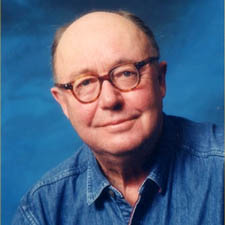 The late, great Roger Needham was one of the wisest men it’s ever been my privilege to know. He was one of the world’s great computer scientists, utterly incorruptible, unimpressed by power and status, and always said what he thought, no matter what the social context. He and his wife Karen Sparck-Jones (who had many of the same qualities) built their first house in the village of Coton with their own hands and lived in it for the best part of four decades. He was a Labour County Councillor for years, owned about two sports jackets and two ties, and made a point of always wearing a red tie whenever a Tory came in to dine at his (and my) Cambridge college. In all the time I knew him he never once sat down at a meeting. Instead he would pace up and down while talking.
The late, great Roger Needham was one of the wisest men it’s ever been my privilege to know. He was one of the world’s great computer scientists, utterly incorruptible, unimpressed by power and status, and always said what he thought, no matter what the social context. He and his wife Karen Sparck-Jones (who had many of the same qualities) built their first house in the village of Coton with their own hands and lived in it for the best part of four decades. He was a Labour County Councillor for years, owned about two sports jackets and two ties, and made a point of always wearing a red tie whenever a Tory came in to dine at his (and my) Cambridge college. In all the time I knew him he never once sat down at a meeting. Instead he would pace up and down while talking.
He also had a lovely, pithy way of summarising awkward truths. When my OU colleague, Martin Weller, and I launched You, your computer and the Net — the Open University’s first major online course — it attracted 12,000 students in its first presentation and nearly broke the university because our regional colleagues suddenly had to recruit, interview, train and mentor enough part-time tutors to meet the university’s 20-to-one tutorial ratio. When I told Roger about this he said: “Ah, I see. What you’ve created is a success disaster”.
He had a phrase to describe projects or products that were near completion and kind-of worked: “Good enough for government work”, he would say.
I’ve just been reading a terrific paper by Frank Stajano on his proposed solution to the growing problems of password-based authentication in which he quotes another of Roger’s famous aphorisms. “Optimisation”, he said, “is the process of taking something that works and replacing it with something that almost works, but costs less.”
LATER: This post prompted a nice email from a friend who also knew (and admired) Roger. It reminded him, he wrote,
“of a talk Roger gave (by video, because he wasn’t well) at a conference I was organising for the Cambridge Society in Lancaster on the Cambridge Phenomenon. There were all kinds of big-wigs there from Lancaster, and from Cambridge. Roger’s talk was on what made the Phenomenon work. It was a brilliant performance – greatly enhanced by his dry comment (speaking as a pro-Vice-Chancellor) that one of the things that made it work was the the University was friendly to it. He added: ‘It wasn’t friendly as a matter of policy; it was far too inefficient for that’ There aren’t many pro-V-Cs of any institution who would risk making a comment like that!”
